|

   
Screenplay by Ian McKellen and Richard Loncraine
| SCENE
88
EXT. GATEWAY TO THE TOWER - DAY
QUEEN ELIZABETH and her daughter PRINCESS
ELIZABETH, with the DUCHESS OF YORK and LADY ANNE, all wrapped up
in furs against the cold, have arrived to see the Princes in The
Tower. The grown-ups are in mourning and veiled. Two limousines
have brought them to The Tower's entrance.
BRACKENBURY stands behind the massive iron
gate, respectful and overwhelmed by this royal visitation.
QUEEN ELIZABETH is confident she will gain
admission to The Tower.
QUEEN ELIZABETH
Brackenbury, how are my sons, the
Princes?
BRACKENBURY
Right well. Your Majesty.
QUEEN ELIZABETH steps forward to the
entrance but BRACKENBURY stops her.
BRACKENBURY
(continuing)
By your patience, I may not permit you
to visit them.
The King has strictly charged the contrary.
QUEEN ELIZABETH
The King! Who's that?
BRACKENBURY
I mean the Lord Protector.
QUEEN ELIZABETH
The Lord protect him from that kingly
title.
I am their mother. Who should keep me from them?
DUCHESS OF YORK
I am their father's mother. I will see
them.
LADY ANNE
I am their aunt. Then bring us to their
sight.
BRACKENBURY
(deeply embarrassed)
I am bound by oath and therefore,
pardon me.
The ladies turn toward their limousines.
DUCHESS OF YORK
(to LADY ANNE)
Go you to Richard - and good angels
guard you!
The CHAUFFEUR opens the car door for LADY
ANNE, who looks more haggard than ever.
QUEEN ELIZABETH
(sobbing)
Stay yet. Look back with me unto The
Tower.
Pity, you ancient stones, those tender princes Whom envy has
immured within your walls. Rough cradle for such little pretty
ones.
Rude, ragged nurse, use my babies well. |
scene 88. From within the
Bankside power station where this scene was shot, a constant
electrical hum almost drowned the dialogue, all of which had to be
re-voiced in a sound studio.
'I am their mother.' The real princes were 13 and 9
years old when they disappeared in 1483. Nearly 200 years later,
the bones of two children were excavated within The Tower and
re-buried in Westminster Abbey.
'I am bound by oath and therefore pardon me.' This sort
of plea was not considered admissible at the Nuremberg Trials. It
is an unenviable job caring for political prisoners, of whatever
age, and treating them like common criminals.
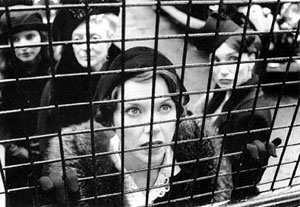
'Rude, ragged nurse, use my babies well.' |
| SCENE
89
INT. LADY ANNE'S LIMOUSINE - DAY
Alone in the back, LADY ANNE hitches up
her skirt and finds the appropriate spot in her much-punctured
thigh. She injects herself with a calming drug. Then she closes
her eyes and waits for it to work.
Over, the triumphal, martial
orchestrations of celebration. |
|
| SCENE
90
INT. THE CATHEDRAL - DAY
The time-honoured glory of the Coronation
reaches its climax - musically and visually.
Everyone of any importance seems to have
squeezed into the medieval cathedral. Dusty, threadworn, military
banners hang from the hammerbeam roof. The PEERS and their
PEERESSES wear ermined coronets, bejewelled tiaras and scarlet
velvet robes.
Tradition and ritual confirm the
legitimacy of RICHARD Ill's struggle to the throne, where in the
distance he is now crowned by the ARCHBISHOP, with LADY ANNE as
his Queen. |
scene 90. The visual climax of
Richard's ascent is the invented scene at the Rally (scene 87).
The Coronation, another scene not in the play, is used by RL to
show the decline of Lady Anne, through whose eyes we watch the
enthronement. At one time, I was expecting a day's filming in
Westminster Abbey. This was too complicated to organise and, as it
turned out, unnecessary. We used a corner of St John the Baptist's
Church in west London, with convincing replicas of the genuine
Coronation paraphernalia. The Sword of State and the Sceptre had
to be clutched together in Richard's one good hand.
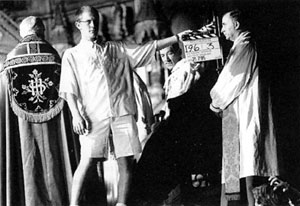
Craig Bloor was our Clapper Loader, the Junior
member of the camera team who loads the film and cares for it and
starts each shot by clapping a stick down onto the board that
records the scene number, thereby synchronising sound and film.
Craig's clapping was always gently unobtrusive, a welcome change
from others I have known who place their board up against the
actor's face, as if hoping to trap a nose as they clap. |
| SCENE
91
INT. PRIVATE VIEWING THEATRE - NIGHT
A pillared art deco hall has been fitted
out with screen and projector, to make a private cinema.
Next to matching armchairs for the KING
and QUEEN, BUCKINGHAM proudly sits. There are rows of gilded,
plush, upright chairs for BRACKENBURY, CATESBY, RATCLIFFE, LORD
STANLEY and TYRELL.
The music continues over the
black-and-white propaganda film which is viewed, with appreciative
applause at times, by the new KING'S COURTIERS, all uniformed in
black.
There is an air of lassitude and fear.
No-one dares to cross RICHARD, yet no-one knows what he wants,
until he tells them.
The doleful LADY ANNE sits upright and
pale, next to RICHARD, who is munching Fortnum's chocolates. He
leans across to BUCKINGHAM, with brandy and cigar. The music keeps
the conversations private.
RICHARD
Now Buckingham! Thus high, by your
advice
And your assistance, is King Richard seated.
But shall we wear these glories for a day?
Or shall they last and we rejoice in them?
BUCKINGHAM
Still live they and for ever let them
last.
RICHARD
The Princes live. Think now what I
would speak.
BUCKINGHAM
Say on. Your Majesty.
|
scene 91. This 4-minute scene
was shot without a break, as the camera slid in front of the
actors, at Eitham Palace in south-east London.
RL was impressed that the actors didn't fluff their lines or
stumble over their moves, until I pointed out that we are used to
even longer takes on stage; as long, that is, as the Act between
the opening line and the curtain call. Here, it is the actors' own
timing which carries the scene, without the later intervention of
the film's editor.
Whether an audience realises the unusual length of the take
does not matter; but perhaps they will sense the relentless way in
which the camera observes Richard's confidence cracking in front
of their eyes.
Fortnum's chocolates. Hitler enjoyed watching newsreel
of his public appearances in the company of his inner circle. He
was also partial to sticky chocolates. I discovered this when
playing the Fuhrer in the drama/documentary Countdown to War
(Granada TV: 1989). |
RICHARD
Why, Buckingham, I say I would be King.
BUCKINGHAM
Why so you are.
RICHARD
The princes live.
Buckingham, you never used to be so dull.
Shall I be plain? I wish the bastards dead.
And I would have it suddenly performed.
What say you now?
RICHARD
(continuing)
Speak suddenly - be brief.
BUCKINGHAM
(rising)
Your Majesty may do your pleasure.
RICHARD
Tut, tut, you are all ice. Your
kindness freezes.
Say, have I your consent that they shall die?
BUCKINGHAM
(bowing)
Give me some little breath, some pause,
Your Majesty,
Before I positively speak in this.
BUCKINGHAM retires to consider his
position.
RICHARD
(to CAMERA)
High-reaching 'Buck-ing-ham' grows
circumspect.
Has he so long held out with me
untired
And stops he now for breath. Well, be it so.
(aloud)
Lord Stanley!
LORD STANLEY
(moving up behind RICHARD)
Your Majesty?
RICHARD
What's the news?
LORD STANLEY
The Archbishop, as I hear,
Has joined with Richmond, Your Majesty, in France.
RICHARD
Richmond aims to marry young
Elizabeth,
My brother Edward's daughter. By that knot, he hopes to get my
crown.
Richmond is your nephew. Well, look to it.
LORD STANLEY hears the warning and
withdraws.
RICHARD
(calling outloud)
Catesby!
CATESBY, ever the King's private
secretary, leans close to RICHARD.
RICHARD
(continuing)
Rumour it abroad
That Anne, my wife, is very grievous sick.
Look how you dream! I say again, give out
That Anne, my queen, is sick - and like to die.
LADY ANNE is in a drugged world other own.
Stunned, CATESBY leaves the room.
|
'Why, Buckingham, I say I would be
King.' Richard does not say what kind of king. Throughout, he
has a need to be active, to re-create the excitement of fighting
in his civilian life. He has no credo and his kingship is
politically barren. His only concern is to hold onto his new
power, not to use it for the benefit of his subjects. Although the
film uses the iconography of fascism, Richard is a dictator pure
and simple, from neither the right nor the left. The fascistic
references are a reminder that an English dictatorship (even by a
Royal claimant) is credible within the 1930s setting.
'Buckingham, you never used to be so dull.' This is my
translation of 'Cousin, thou wast not wont to be so dull' (4.2).
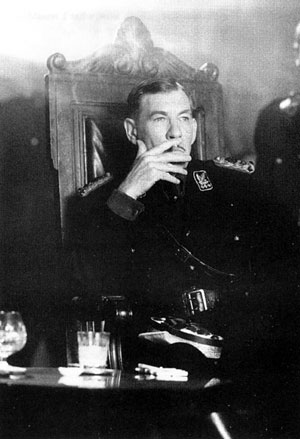
|
RICHARD
(continuing)
Tyrell!
(to CAMERA)
I must be married to my brother's
daughter,
Or else my kingdom stands on brittle glass.
Murder her brothers and then marry her.
TYRELL arrives and stands by RICHARD'S
chair. RICHARD beckons him closer.
RICHARD
(continuing sotto voce)
Dare you resolve to kill a friend of
mine?
TYRELL
Please you; but I'd rather kill two
enemies.
RICHARD
Why, there you have it. Two deep
enemies. Tyrell . . .
(into his ear)
... I mean those bastards in The
Tower.
Say it is done, and I will love you for it.
TYRELL
It is done. Your Majesty.
As BUCKINGHAM returns, RICHARD dismisses
TYRELL, who leaves the room. BUCKINGHAM stands provocatively
between RICHARD and the screen.
BUCKINGHAM
(loud)
Your Majesty, I claim the Earldom of
Hereford,
The which you promised I should possess.
The court tries not to appear to listen.
RICHARD
Well, let that rest.
RICHARD rises and moves away to the long
windows that lead onto the balcony.
RICHARD
(continuing)
The Archbishop's fled to Richmond.
BUCKINGHAM follows RICHARD out onto the
balcony.
BUCKINGHAM
I hear the news. |
'Tyrell!' In the play, this is
the first appearance of Tyrell, the 'discontented gentleman', who
is recruited by King Richard to dispatch the princes in The Tower.
Although it is said that gold will 'tempt him to anything', Tyrell
employs two others to do these murders. All three are appalled at
the 'piteous massacre'. Tyrell tells the tale in a 23-line
soliloquy to the audience, which Richard does not hear. He invites
Tyrell to
. . . come to me soon at after-supper,
When you shall tell the story of their death.
What transpires at this intimate, late-evening rendezvous,
Shakespeare does not reveal and Tyrell leaves the play. Richard
Eyre extended the part as far as the battle, where Tyrell is one
of Richard's inner circle, along with Ratcliffe and Norfolk,
another adjutant who is missing from the film.
It seemed credible that the ever-obliging Tyrell could engineer
all the murders. As in the play, Richard half-befriends his
accomplice. Their relationship contrasts with the professional
reserve which separates Richard from his other intimate,
Ratcliffe.
In Adrian Dunbar's perfectly judged performance, Tyrell likes
taking orders not just because he is a loyalist but because he
relishes his cunning as an assassin. Not just a thug, he takes
pride in a job well done. He likes being close to Richard -
amorality and ambition are a lethal combination. They remain
dependent on each other to the end.
'It is done. Your Majesty.' Unlike Buckingham, Tyrell
does not seem to hesitate at the suggestion of infanticide. He is
rewarded with the promise of Richard's 'love' - a rare commodity,
only otherwise mentioned when Richard seduces Lady Anne. |
| SCENE
92
EXT. BALCONY - PRIVATE VIEWING THEATRE
- NIGHT
Backed by a massive clock, the large
balcony looks out onto the twinkling lights of the capital city.
Traffic sounds below. The two old allies stand side by side.
Behind them, the film continues to be projected.
BUCKINGHAM
(continuing)
What says Your Majesty to my just
request?
RICHARD
As I remember, it was prophesied,
That Richmond should be King! A king! Perhaps . . .
BUCKINGHAM
(more insistent)
Your promise for the Earldom!
|
|
RICHARD
(a mocking pronunciation)
Riche - monde!
BUCKINGHAM
Your Majesty -
RICHARD
Yes! What's o'clock?
BUCKINGHAM
I am thus bold to put
Your Majesty in mind Of what you promised me.
RICHARD
Well: but what's o'clock?
BUCKINGHAM
(consulting his fob watch)
Upon the stroke of ten.
RICHARD
Well, let it strike.
BUCKINGHAM
Why let it strike?
RICHARD
Because that, like a Jack, you keep the
stroke
Between your begging and my meditation.
I am not in the giving vein today.
BUCKINGHAM
Why then, resolve me whether you will
or no.
RICHARD
You trouble me. I am not in the vein!
The clock behind them deafeningly chimes
ten.
RICHARD strides back into the room, which
he leaves, followed obediently by BRACKENBURY, RATCLIFFE and LORD
STANLEY.
BUCKINGHAM
And is it thus?
Repays he my deep service With such contempt?
BUCKINGHAM shivers and goes back into the
room. |
'Riche-monde!' Richard contains
his fear about Richmond and Buckingham by mocking their names:
'Bucking-foam' and, here, 'Riche-monde', a. disparaging reference
to his forces being marshalled in France. Lady Thatcher privately
referred to her principal opponent as 'Kin-nock'.
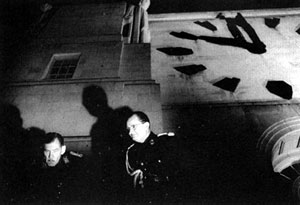
'Upon the stroke of ten.' The clock on the facade of the
Shell-Mex House overlooks the Thames and is reputedly the largest
in Europe. Throughout the evening we filmed, its hands were fixed
at 10 o'clock. As it does not strike, the chimes were added later.
Ironically we could only film (and record sound) between the
quarter-hour booms of Big Ben, as it kept proper time a half-mile
upstream above the Houses of Parliament.
Here was another opportunity for Richard to appear shorter.
'And is it thus?' This brief speech was cut because Jim
Broadbent's expressive face said it all. Their partnership was
never an equal one - although it takes half-a-dozen murders for
Buckingham to realise that Richard has an agenda that does not
include both of them. He has compromised and worked harder than
ever in his charmed life, to help 'Buckingham/Gloucester Inc.' to
succeed. He might even collude in infanticide, if only Richard
would hand over the reward he has promised. But there is no
honour, even among titled thieves. |
| SCENE
93
INT. PRIVATE VIEWING THEATRE - NIGHT
BUCKINGHAM, thinking he is alone, slumps
in the nearest chair.
LADY ANNE
0 never yet one hour in his bed,
Have I enjoyed the golden dew of sleep;
But have been wakened by his timorous dreams.
Besides, he hates me:
And will, no doubt, shortly be rid of me.
BUCKINGHAM
0, let me think of Hastings and be
gone.
BUCKINGHAM looks at LADY ANNE. They have
both been duped by RICHARD. But there is no time to sympathise.
BUCKINGHAM has decided to escape, leaving
LADY ANNE alone, catatonic. |
'0 never yet one hour in his bed,
Have I enjoyed the golden dew of sleep . . .' Another
foretaste of Macbeth, who murders sleep, and of his wife, who
sleep-walks. It is a telling insight that Richard has regular
nightmares, leading up to the night before the battle when his
final dream is dramatised.
|
| SCENE
94
INT. THE PRINCES' CELL - THE TOWER -
DAY
TYRELL holds a tightly woven, red silk
scarf over the face of PRINCE JAMES. As the victim gasps for air,
the silk is drawn into his mouth and deep into the throat. |
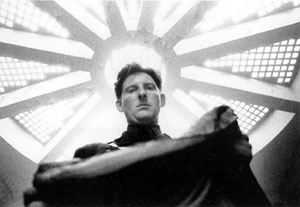
scene 94. |
| SCENE
95
INT. GRAND STAIRCASE - THE PALACE - DAY
QUEEN ELIZABETH sits alone on the stairs.
The shock of her sons' death fills her heart and will not be
released until she faces the man who ordered their murder. |
|
| SCENE
96
INT. THE KING'S OFFICE - DAY
RICHARD is seated at his desk. An
impressive self-portrait of him in his new black uniform dominates
the room.
TYRELL enters.
RICHARD
Kind Tyrell. Am I happy in your news?
TYRELL
It's done. Your Majesty.
RICHARD
But did you see them dead?
TYRELL
I did. Your Majesty.
RICHARD
And buried, gentle Tyrell?
TYRELL nods.
RICHARD
(continuing)
Come to me, Tyrell . . . soon ... at
after- supper,
When you shall tell the story of their death.
Meanwhile, but think how I may do you good:
And be inheritor of your desire. Till then . . .
TYRELL leaves, and RICHARD, left alone,
turns to look at his image on the wall behind.
RICHARD
(continuing)
The sons of Edward sleep in Abraham's
bosom;
And Anne - my wife - shall bid the world good
night.
Uncertain way of gain. But I am
in
So far in blood, that sin will pluck on sin. Tear-falling pity
dwells not in this eye. |
'I am in
So far in blood, that sin will pluck on sin': cf. Macbeth's
'I am in blood
Stepped in so far, that should I wade no more,
Returning were as tedious as go o'er.'(3.4)
Richard's confession that he has sinned is put aside by his
determination to control the conscience which will erupt in his
nightmare in scene 110.
|
| SCENE
97
INT. LADY ANNE'S BEDROOM - THE PALACE -
DAY
The heavy curtains are drawn, but a crack
of sunlight from the middle slices across the room. ANNE lies in
her bed. She seems to be staring at a large black spider that
drops slowly on its thread from above her.
The spider lands on LADY ANNE's pale face
and crawls delicately across one unblinking eye. |
scene 97. Shakespeare does not
make it clear how Anne dies - an overdose perhaps or does Tyrell
pay her a visit? Whichever way, Richard is responsible for her
fatal decline.
Queen Elizabeth calls Richard 'a bottled spider' (scene 41).
I saw Robert Helpmann as Richard III mount the Old Vic stage
(1957) in front of a backcloth painted with a huge spider's web.
Tony Sher for the RSC (1984), on crutches and with long, dangling
sleeves, also invited arachnid comparisons. Here, film of a model
spider was superimposed on a static shot of Kristin Scott Thomas's
face.
|
| SCENE
98
INT. CORRIDOR OUTSIDE THE KING'S OFFICE
-DAY
The door to the King's office opens and
RICHARD, dressed in his black leather greatcoat, cap, gloves and
carrying his officer's baton, strides out into the corridor with
TYRELL.
As they walk across the galleried landing
towards the stairs, RATCLIFFE appears and calls after RICHARD.
RATCLIFFE
Your Majesty!
RICHARD
Ratclifie.
RATCLIFFE
Upon the southern coast, there rides a
powerful navy.
It's thought that Richmond is
its admiral.
Buckingham has fled, to welcome him ashore.
RICHARD
We must be brief when traitors brave
the field!
Before RATCLIFFE has time to leave, the
DUCHESS OF YORK appears at the top of the stairs.
DUCHESS OF YORK
Are you my son?
RICHARD is startled by her voice but
recovers.
RICHARD
Yes, I thank God, my father and
yourself!
|
scene 98. Mezzanine of the
Senate House. |
DUCHESS OF YORK
You toad! Where are the Princes? And
your wife?
RICHARD
Mother, I have a touch of your
condition,
That cannot bear the accent of reproof.
No-one has invited RATCLIFFE and TYRELL to
leave. They observe stony-faced.
DUCHESS OF YORK
0, let me speak.
RICHARD
Be brief, good Mother, for I am in
haste.
DUCHESS OF YORK
(ignoring TYRELL and RATCLIFFE)
A grievous burden was your birth to me.
RICHARD
(who has heard this before)
And came I not, at last, to comfort
you?
DUCHESS OF YORK
You came on earth to make the earth my
hell.
Tetchy and wayward was your infancy;
Your schooldays frightful, desperate, wild and
furious;
What comfortable hour can you
name,
That ever graced me with your company?
RICHARD
(dismissively)
If I be so disgracious in your eye -
DUCHESS OF YORK
- Hear me a word! For I shall never
speak to you again.
RICHARD
(looking directly at her)
So?
DUCHESS OF YORK
To war take with you my most grievous
curse!
My prayers shall on Richmond's party fight. Bloody you are: bloody
will be your end.
Shame serves your life - and will your death attend!
She has finished cursing.
RICHARD, the resplendent
Commander-in-Chief, is ready to leave. Winking at TYRELL who
follows, RICHARD pushes past the DUCHESS OF YORK, out into the
corridor and off to war. RATCLIFFE marches behind.
Mother and son will not meet again. |
'You toad!' This epithet echoes
Queen Margaret: 'this poisonous bunch-backed toad' (1.3).
In the play, the Duchess of York and Queen Elizabeth bewail
with Queen Margaret, as they await Richard's departure for war.
Onstage, we called it 'the Greenham Common' scene. It has 135
lines before the women confront the man they all hate. Some of the
deleted lines of Queen Margaret have been given to the Duchess.
Queen Elizabeth's subsequent exchange with Richard is delayed
until scene 101.
'You came on earth to make the earth my hell.' cf. Lady
Anne's "You have made the happy earth my hell' (scene 23).
Whatever justice there is in the Duchess of York's disaffection
towards her youngest son, it is based on her disappointment and
disgust at his physique. Perhaps it was from his mother that
Richard learnt how to hate so fiercely.
'To war take with you my most grievous curse!' Richard
is speechless at his mother's insistent prayer that he should die
in battle. As she leaves, he is aware that the family row has been
witnessed by Ratcliffe and Tyrell.
|
| SCENE
99
EXT. SUBURBAN AERODROME - DUSK
An Imperial Airways passenger plane, its
engines ticking over, is ready to fly across the English Channel
to France.
The DUCHESS OF YORK makes her way from her
car to the waiting aircraft. QUEEN ELIZABETH and PRINCESS
ELIZABETH have come to see her off- both wrapped up against the
stiff breeze.
An AIRCRAFTSMAN carries the leather
luggage.
DUCHESS OF YORK
(above the roar of the engines)
I leave for France. Be not
tongue-tied.
You are a dream of what you were, a breath,
A queen in jest. Where is your husband now?
Where is your brother? Where are your two sons?
Wherein joy? Who sues and kneels and says 'God Save the
Queen'?
Where be the bending peers that nattered you?
Where be the thronging troops that followed you?
QUEEN ELIZABETH is crying as they kiss
goodbye.
The DUCHESS OF YORK is helped onboard the
plane by the AIRCRAFTSMAN.
QUEEN ELIZABETH
(desperately shouting up to the DUCHESS OF YORK)
0 teach me how to curse my enemy!
DUCHESS OF YORK
(shouting back as the steps are moved away)
Forbear to sleep the nights and fast
the days.
Think that your babes were sweeter than they were;
And he that slew them, fouler than he is! |
scene 99. Shoreham Aerodrome is
a relic from early passenger flight. It was a part of the nation's
defence against enemy air attack in the Second World War. These
days, it services private planes, flying teachers and their
pupils. We shot here by lucky chance on one of the very few dull
days in the glorious summer of 1995. The misty atmosphere was
created by oil-based smoke supplied by the property department.
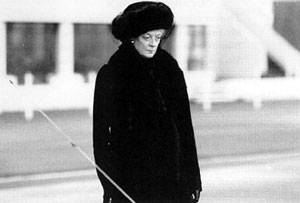
'I leave for France.' In the play, it is
Queen Margaret who returns to her homeland, France. |
|
